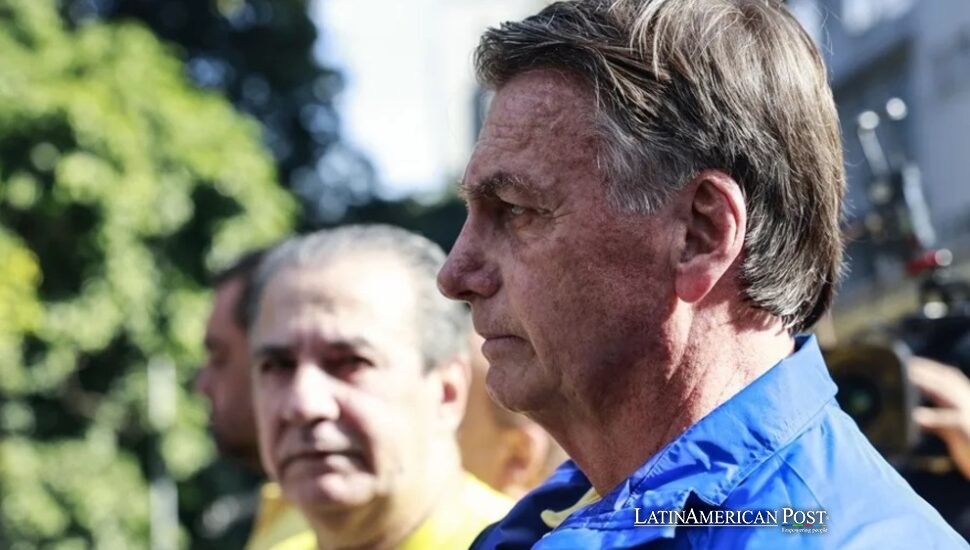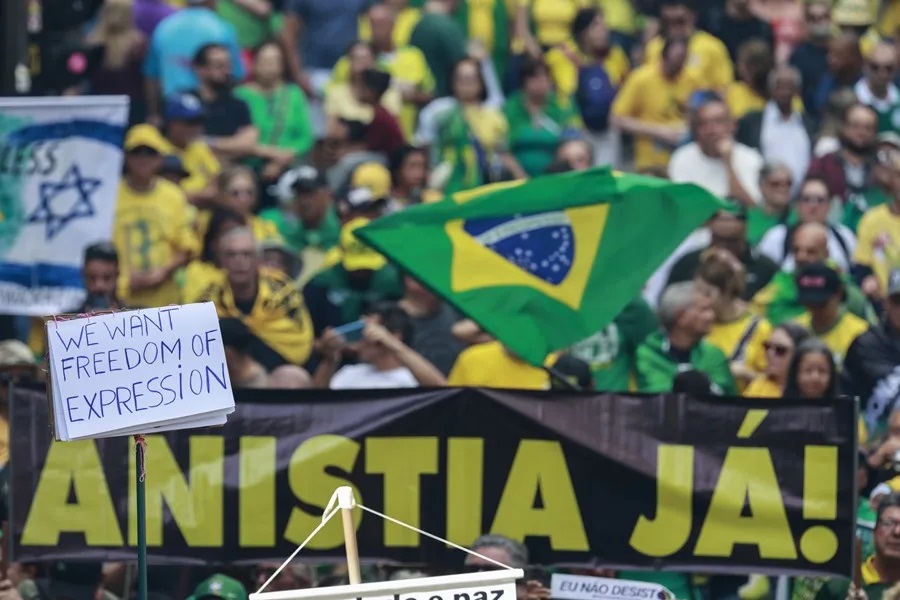Brazil Weighs Justice as Street Flags Blur into Rival Camps

What should have been a patriotic holiday of flags, music, and barbecue became a test of Brazil’s democracy. As the Supreme Court weighs Jair Bolsonaro’s alleged coup plot, rival camps filled the streets, their banners carrying very different versions of “freedom.”
Independence Day in Two Colors
In São Paulo and across the country, green-and-yellow flags—long symbols of Jair Bolsonaro’s right-wing base—waved beside banners demanding “Amnesty!” and calls for Supreme Court Justice Alexandre de Moraes to resign. Mixed into the sea of Brazil jerseys were red hats and Trump banners, a clear nod to the former U.S. president who has branded Bolsonaro’s trial “political persecution.”
The BBC reported how Trump’s sanctions on Brazilian goods and tariffs of 50% thrilled Bolsonaro loyalists like Bianca, wrapped in a U.S.-Brazil flag. “Freedom comes first,” she told the BBC, echoing lobbying by Bolsonaro’s son Eduardo in Washington. Others recoiled, calling it unpatriotic to celebrate foreign penalties against their own economy. At counter-rallies, inflatable caricatures of Bolsonaro in prison stripes and Trump looming over Brazil drew cheers. “Prison for Bolsonaro,” read one sign. Rafael, an opponent, told the BBC that an arrest would be a “victory” after “serious crimes.” Another protester, Karina, said the evidence proved “a coup attempt” and hoped a conviction would set a lasting precedent.
Independence Day, usually a festival of parades and music, became a referendum in two colors: Bolsonaro’s green and yellow, and his opponents’ red and blue, both claiming to defend freedom.
A Trial That Tests the Guardrails
Starting Tuesday, Brazil’s top court will deliver its verdict one justice at a time. The accusations are sweeping: that Bolsonaro tried to sell a coup plan to generals, had foreknowledge of a plot to kill President-elect Luiz Inácio Lula da Silva and Justice Moraes, and incited the January 8 mob that ransacked Congress and the Supreme Court after months of discrediting electronic voting. Bolsonaro denies it all.
His supporters dismiss the process as scripted. “Just a big theatre,” said Erica, quoted by the BBC at a pro-Bolsonaro rally, insisting conviction is inevitable regardless of evidence. Yet for his critics, the risk lies in impunity. Brazil’s dictatorship ended only in 1985; the chant “Dictatorship, never again” echoed through anti-Bolsonaro rallies with the cadence of a vow.
Some tried to reclaim the national football jersey from Bolsonaro’s image. A hand-painted shirt read: “I am not a Bolsonaro minion.” Centrist voices whispered another hope to the BBC: that a clear verdict could finally draw a legal line, even if it cannot bridge Brazil’s fractured society.
The Court in the Crossfire
No institution embodies the tension between law and politics more sharply than Brazil’s Supreme Court. Justices are presidential appointees, but they also serve on the electoral tribunal, review laws, and prosecute sitting politicians. In recent years, the Court has cast itself as democracy’s guardian—making it the lightning rod of national politics.
Justice Moraes, in particular, has led a muscular “fake news” inquiry that jailed Bolsonaro allies and shuttered social media accounts spreading threats. Supporters hail it as necessary; critics call it judicial overreach. The contradictions converge in this trial: Moraes is both rapporteur and alleged assassination target.
For Bolsonaro’s camp, this is proof of bias. They cite examples like Débora Rodrigues dos Santos, a mother of young children sentenced to 14 years after scrawling “You lost, idiot” in lipstick on the Court’s statue during the January 8 riot. Though her sentence was reduced to house arrest, her case remains a rallying cry. Her sister Claudia told the BBC: “They tried her for graffiti.” To her, if no coup succeeded, none was attempted.
Opponents counter that the offense lies in the planning and incitement itself—not just whether tanks rolled in the streets. The Court, in their eyes, is drawing the line where democracy must.

EFE@Sebastiao Moreira
What a Verdict Could Unleash
The stakes extend beyond Bolsonaro. Ricardo Cappelli, appointed to restore order in Brasília after the riots, called the attacks on the Court “barbaric acts” against an institution fundamental to democracy. He told the BBC the trial could “turn a page in history” by showing coup plots have consequences. He warns against amnesty, recalling how past pardons only encouraged new coups.
But geopolitics weigh heavily. Trump’s tariffs and sanctions have transformed a domestic trial into a sovereignty test. Even some conservatives told the BBC they resent foreign interference. Bolsonaro’s critics counter that he himself welcomed it, applauding sanctions that hurt Brazilian exporters to strengthen his case abroad.
The tension boils down to two irreconcilable definitions of freedom. One side sees judicial action as authoritarian. The other sees Bolsonaro’s defiance of rules as the road to authoritarianism. In WhatsApp chats and cafés, moderates wish a decisive ruling might finally close the Bolsonaro chapter. But with a court many conservatives mistrust, a defendant many progressives view as uniquely dangerous, and an electorate primed by grievance and algorithms, clarity of law may only deepen political rupture.
Also Read: Latin America Is Europe’s Missing Ally in a Harder World
For now, Brazil waits—flags in hand, slogans rehearsed—suspended between parade and verdict, between patriotism and polarization. The next chapter will decide whether September’s parades are remembered as a celebration of independence or a prelude to a more profound reckoning.




